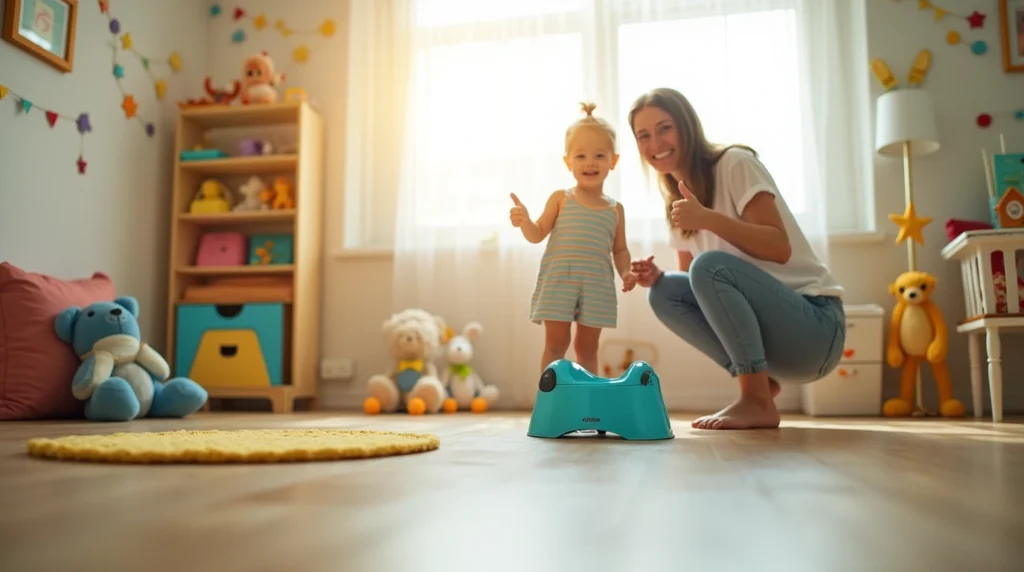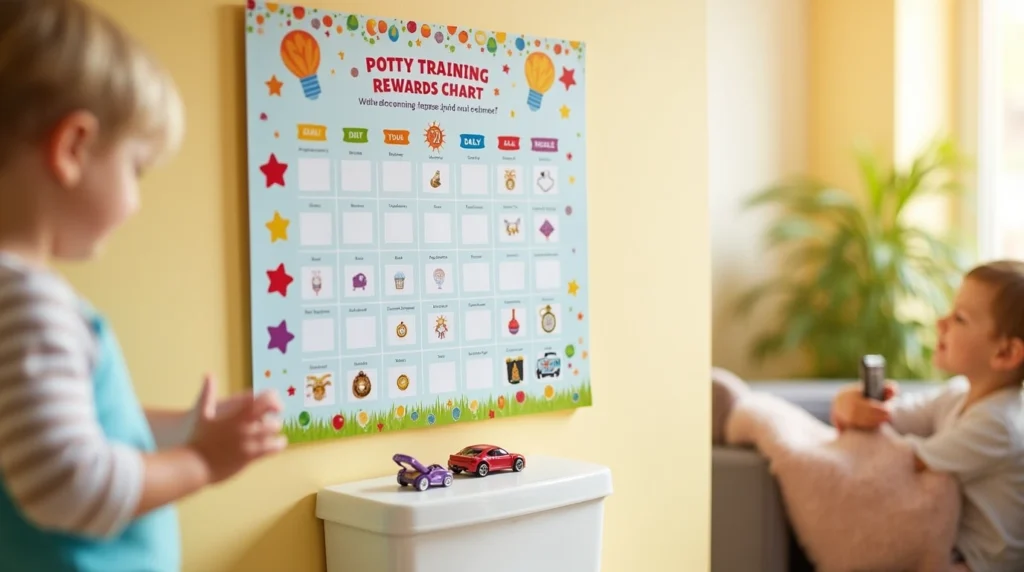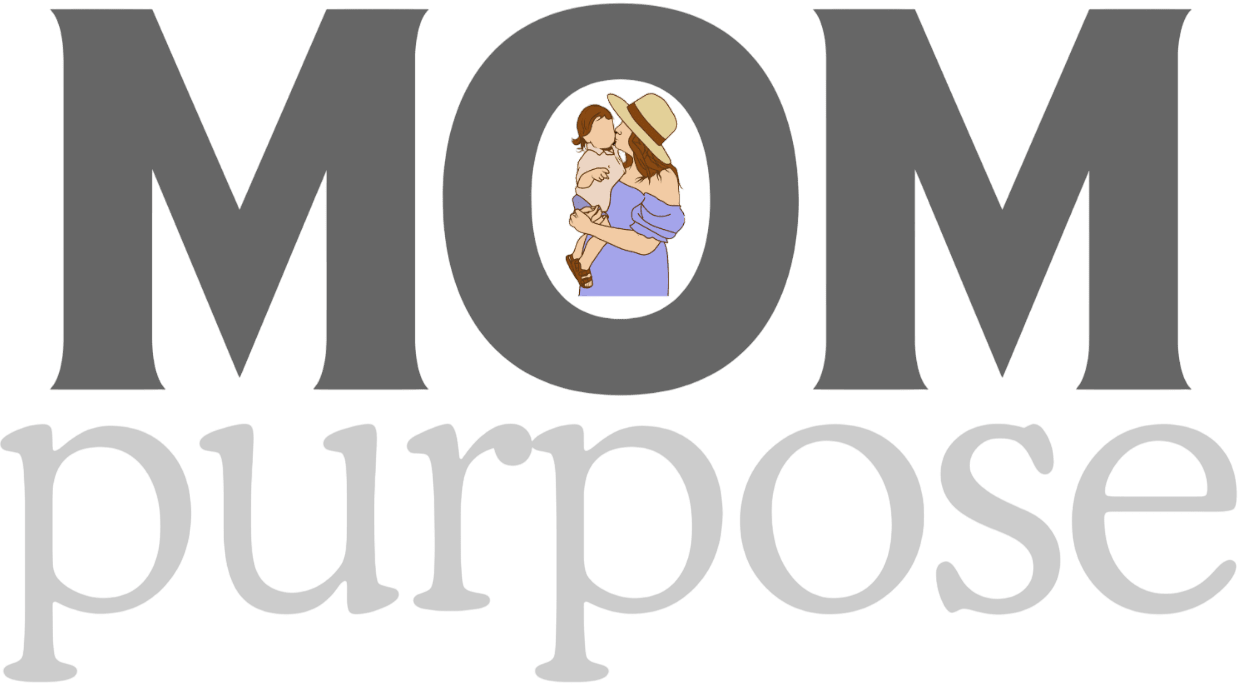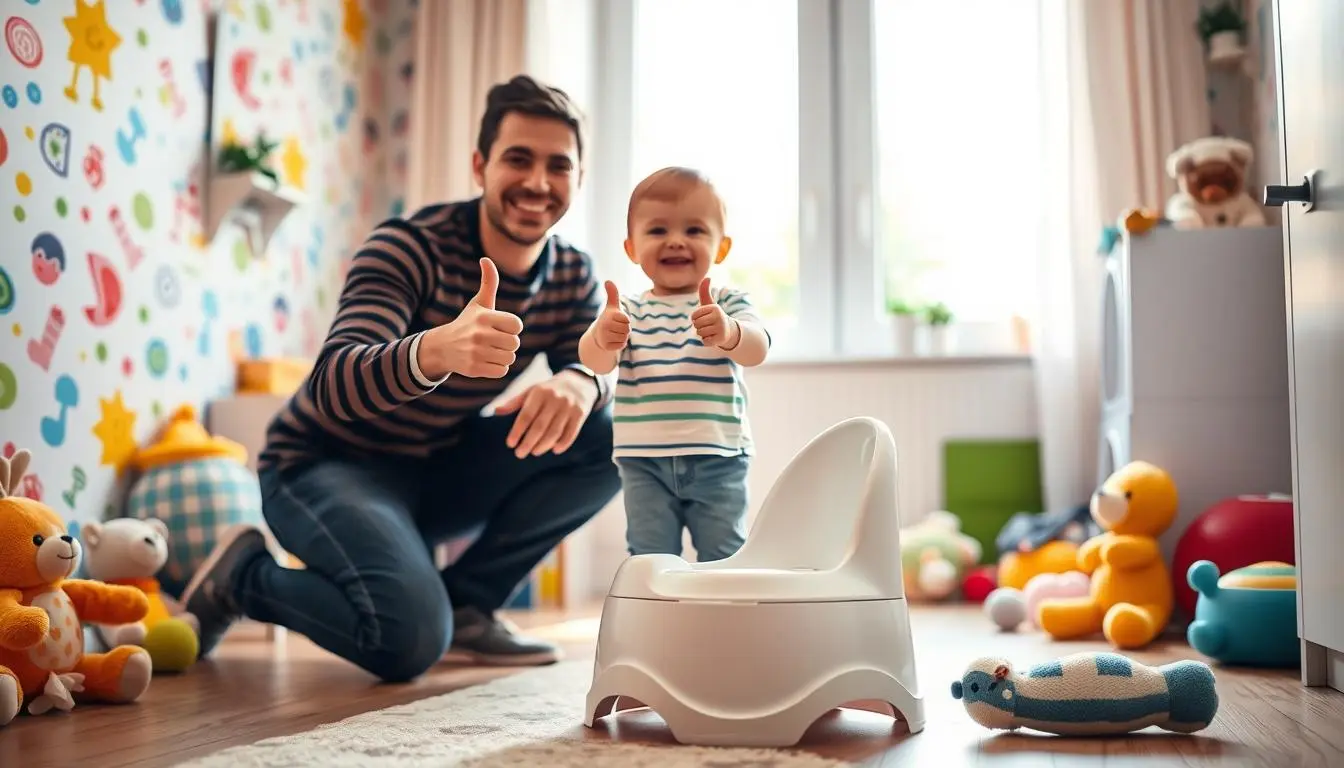Rewards for Potty Training
Potty training can be tough for both parents and kids. As a parent, I know how key it is to find good rewards for potty training. This guide will show you how to use rewards to make potty training easier and fun.
The right rewards for potty training can turn this milestone into a positive experience. My method is to create a supportive space that celebrates every little win. This helps kids feel confident and independent as they learn.
Key Takeaways
- Understand the psychology behind effective rewards for potty training
- Learn age-appropriate reward strategies
- Discover creative ways to motivate your child
- Avoid common reward-related challenges
- Create a positive potty training experience
- Build your child’s confidence through recognition
Understanding the Psychology of Rewards for Potty Training
Potty training is a big step for kids and parents. The right rewards can make it fun and exciting. It’s all about finding the right way to motivate your child.
Every child is different when it comes to motivation. Potty training prizes should make them feel special and accomplished. For 2-year-olds, it’s all about building their confidence and independence.
The Power of Positive Reinforcement
Positive reinforcement is key to potty training success. Parents can create a supportive environment. This encourages kids to learn and grow.
Effective rewards for 2-year-olds should include:
- Immediate praise and excitement
- Small, meaningful prizes
- Consistent recognition of effort
- Visual tracking of progress
Understanding Reward Responses
Children respond differently to rewards. Some like stickers, others prefer small toys or special treats. It’s important to find what works best for your child.
Building Intrinsic Motivation
It’s not just about the rewards. We want kids to be motivated from within. Praise, hugs, and genuine excitement can be more powerful than gifts.
Creating a positive emotional connection helps kids feel proud and accomplished. It makes potty training a rewarding experience.

Best Potty Training Reward Systems That Work
Starting potty training can be tough, but the right rewards make it easier. A good potty training rewards chart motivates kids and tracks their progress in a fun way.
I suggest making a visual potty training reward jar. It lets kids see their progress. This turns potty training into a fun journey of success. The jar is a great motivator that keeps kids focused.
- Choose a clear glass jar or colorful container for your potty training reward jar
- Select small, exciting rewards that fit inside the jar
- Let your child help decorate the potty training rewards chart
- Use stickers or tokens to mark successful bathroom trips
When making your potty training rewards chart, think about your child’s likes and personality. Some kids like quick rewards, while others prefer bigger prizes. The most important thing is to be consistent and positive.
Here are some effective strategies for your reward system:
- Start with frequent, immediate rewards
- Gradually reduce reward frequency as skills improve
- Celebrate small victories with enthusiasm
- Be patient and supportive throughout the process
Every child is different. What works for one might not work for another. Be flexible and change your potty training rewards chart as needed. This will keep your little one excited and motivated.
Creative and Cost-Effective Potty Training Prizes
Potty training can be tough, but the right rewards make it fun for everyone. Finding the best potty training rewards for boys needs creativity and patience.
Finding the right motivators for kids to use the potty can be hard. It’s important to know what your child loves and keep rewards affordable and meaningful.
Immediate vs. Delayed Rewards
Choosing between immediate and delayed rewards is key to success. Immediate rewards give instant joy, while delayed rewards teach patience and goal setting.
- Sticker charts for tracking progress
- Small toy prizes after consistent performance
- Special activity privileges
Age-Appropriate Reward Ideas
Think about your child’s interests and age when picking potty training rewards. Boys often like rewards that feel like games or challenges.
- Superhero-themed sticker collections
- Small construction or action figure rewards
- Vehicle or dinosaur-themed prizes
DIY Reward Options
Homemade rewards can be fun and won’t cost much. They’re great for potty training boys.
- Handmade reward coupons
- Custom progress tracking charts
- Special one-on-one activity time
The best potty training rewards match your child’s personality and what motivates them.
Setting Up Your Potty Training Reward Chart
Creating a potty training rewards chart can change the potty training game for everyone. A good chart is a visual motivator. It tracks progress and celebrates every win.
When making your potty training rewards chart, keep these tips in mind:
- Choose a colorful and engaging design that captures your child’s attention
- Use stickers or stamps to mark successful bathroom trips
- Create clear, achievable goals for your child
- Make the chart interactive and fun
Your potty training rewards chart should match your child’s interests. Some kids love superhero charts, while others prefer cartoon or animal designs. The aim is to make the rewards feel exciting and special.
Here’s a simple way to start using your potty training rewards chart:
- Select a large poster or chart paper
- Create sections for different bathroom milestones
- Establish a reward system with small prizes or privileges
- Update the chart consistently
- Offer verbal praise alongside visual rewards
Remember, being flexible is crucial with a potty training rewards chart. As your child grows, you might need to change the goals and rewards. This keeps them motivated and successful.

Troubleshooting Common Reward-Related Challenges
Potty training rewards can sometimes hit roadblocks that frustrate parents. When your initial potty training prizes start losing their magic, it’s time to get creative and strategic.
Reward fatigue is a common challenge many parents encounter. Children might become less excited about their potty training rewards after initial enthusiasm wanes. To combat this, I recommend rotating different types of rewards to keep motivation high.
- Create a diverse reward system that includes:
- Sticker charts
- Small toy surprises
- Special activity tokens
When potty training rewards seem ineffective, consider these strategies:
- Gradually reduce reward frequency
- Shift from material prizes to verbal praise
- Implement more complex reward structures
Remember that every child responds differently to potty training prizes. What works for one might not work for another. Flexibility is key in maintaining your child’s motivation and progress.
As your child becomes more consistent with using the potty, start transitioning away from tangible rewards. Celebrate their growing independence with enthusiastic verbal recognition and small, intermittent surprises.
Conclusion
Exploring potty training rewards can be tough. I’ve shared tips to make this journey positive for parents and kids. It’s not just about stickers or treats. It’s about boosting confidence and motivation.
Every child is different when it comes to potty training rewards. What works for one might not work for another. The best way is to be patient, creative, and always positive.
Try out different reward systems to find what really motivates your child. This helps them feel excited about learning to use the potty.
Remember, potty training is a journey. Every small success is worth celebrating. Thoughtful rewards create a supportive space for your child to grow.
Stay open-minded and supportive. Celebrate each step towards independence. This way, potty training becomes a fun and stress-free experience for your child.
FAQ – Rewards For Potty Training
At what age should I start using potty training rewards?
Start potty training rewards between 18 months and 3 years old. Look for signs like staying dry longer, showing interest in the bathroom, or following simple instructions.
How often should I give rewards during potty training?
Give rewards right after successful potty attempts. Start with rewards for every success to boost confidence. As your child gets better, you can give rewards less often or use a chart to track progress.
What are the best types of rewards for potty training?
Choose small, immediate, and meaningful rewards. Stickers, small toys, extra playtime, or special activities are great. Pick rewards that excite your child but aren’t too big.
How long should I continue using potty training rewards?
Stop using rewards in 2-3 months as your child gets more confident. Start with lots of rewards, then slowly give less. Use verbal praise and encouragement instead of prizes.
Can rewards become a problem during potty training?
Rewards can be a problem if used too much. Avoid making rewards too big or expecting a prize for every visit. The goal is to make your child want to use the potty on their own.
What if my child loses interest in the current rewards?
Mix things up by changing rewards. Try different prizes or a chart with many options. Watch what your child likes and adjust your rewards.
Are there non-material rewards I can use?
Yes! Verbal praise, extra cuddles, special activities, or a “potty dance” can motivate. Use these along with small prizes to keep your child excited.
How do I handle setbacks in potty training?
Stay patient and positive. Avoid punishment and keep encouraging. Setbacks are normal. A supportive approach will help your child stay motivated.
What is the reward system for toilet training?
Use a sticker chart to track progress. Give small rewards for each success and bigger rewards for milestones, like staying dry all day.
What is the 10-10-10 rule for potty training?
Every 10 minutes, remind your child to try the potty. Spend 10 seconds encouraging them, and give 10 words of praise, even if they don’t go.
What are the three C’s of potty training?
- Consistency: Stick to a routine.
- Communication: Talk openly and celebrate successes.
- Celebration: Use rewards and praise to make it fun!

